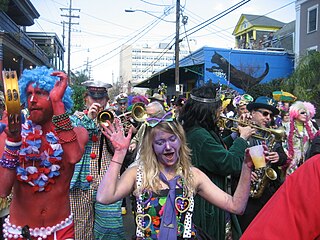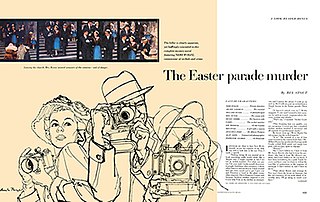
The Easter Rising, also known as the Easter Rebellion, was an armed insurrection in Ireland during Easter Week, April 1916. The Rising was launched by Irish republicans to end British rule in Ireland and establish an independent Irish Republic while the United Kingdom was heavily engaged in the First World War. It was the most significant uprising in Ireland since the rebellion of 1798, and the first armed action of the Irish revolutionary period.

A parade is a procession of people, usually organized along a street, often in costume, and often accompanied by marching bands, floats, or sometimes large balloons. Parades are held for a wide range of reasons, but are usually celebrations of some kind. In Britain, the term parade is usually reserved for either military parades or other occasions where participants march in formation; for celebratory occasions, the word procession is more usual. In the Canadian Forces, the term also has several less formal connotations.

Mardi Gras, or Fat Tuesday, refers to events of the Carnival celebration, beginning on or after the Christian feasts of the Epiphany and culminating on the day before Ash Wednesday. Mardi Gras is French for "Fat Tuesday", reflecting the practice of the last night of eating rich, fatty foods before the ritual fasting of the Lenten season.

Saint Patrick's Day, or the Feast of Saint Patrick, is a cultural and religious celebration held on 17 March, the traditional death date of Saint Patrick (c. AD 385–461), the foremost patron saint of Ireland.

Easter Monday is the day after Easter Sunday and is a holiday in some countries. Easter Monday in the Western Christian liturgical calendar is the second day of Eastertide and analogously in the Byzantine Rite is the second day of Bright Week.

Christopher Street Day (CSD) is an annual European LGBT celebration and demonstration held in various cities across Europe for the rights of LGBT people, and against discrimination and exclusion. It is Germany's and Switzerland's counterpart to Gay Pride or Pride Parades. Austria calls their Pride Parade Rainbow Parade. The most prominent CSD events are Berlin Pride, CSD Hamburg and CSD Cologne, Germany; and Zürich in Switzerland.

The Sydney Royal Easter Show, also known as the Royal Easter Show, The Easter Show or The Royal, is an annual show held in Sydney, Australia over two weeks around the Easter period. It comprises an agricultural show, an amusement park and a fair and combines the elements of each, showcasing the judging of livestock and produce. The event is run by the Royal Agricultural Society of New South Wales and was first held in 1823. Queen Victoria awarded the society and its show the right to use the word "Royal" in its name.

An Easter bonnet is any new or fancy hat worn as a Christian headcovering on Easter, by tradition. It represents the tail-end of a tradition of wearing new clothes at Easter, in harmony with the renewal of the year and the promise of spiritual renewal and redemption.
Arthur Krams was an American set designer. He first made a name for himself working for MGM on films such as Holiday in Mexico, Easter Parade and The Student Prince in the mid 1940s. Later, he went on to work with Paramount Pictures. While there, he shared an Oscar for The Rose Tattoo (1955). Over his career, Krams would be co-nominated for an Oscar seven more times.
"Steppin' Out with My Baby" is a popular song written by Irving Berlin and introduced in the 1948 musical film Easter Parade. There it was sung by Fred Astaire as part of a dance number involving Astaire on stairs and three different dance partners.
Parades are an important part of the culture of Northern Ireland. Although the majority of parades are held by Ulster Protestant, unionist or Ulster loyalist groups, Irish nationalist, republican and non-political groups also parade. The Parades Commission exists to settle disputes about controversial parades, and although not all parading groups recognise the Commission's authority, its decisions are legally binding.

I Want to Go Back to Michigan is a song by Irving Berlin composed in 1914. It was a moderate commercial success when it was first released and afterward became a staple on vaudeville. Its most famous performance was by Judy Garland in the film Easter Parade.
The First Easter Rabbit is an animated Easter television special that premiered April 9, 1976 on NBC and later aired on CBS. Created by Rankin/Bass, it tells the story of the Easter Bunny's origin. The special is loosely based on the children's book The Velveteen Rabbit by Margery Williams. Burl Ives did the narration for this special which also featured the song "Easter Parade". Following 1964's "Rudolph the Red-Nosed Reindeer", this is the second Rankin/Bass special to be narrated by Burl Ives.

The Berlin Pride Celebration, usually known as CSD Berlin, is a parade and festival held in the second half of July each year in Berlin to celebrate the lesbian, gay, bisexual, and transgender (LGBT) people and their allies. CSD stands for Christopher Street Day. Since 1979, the event has been held each year. Berlin Pride is one of the largest gay and lesbian organized events in Germany and one of the biggest in Europe. Its aim is to demonstrate for equal rights and equal treatment for LGBT people, as well as celebrate the pride in Gay and Lesbian Culture.

The Kreuzberg Pride, usually known as Transgenialer CSD, was a parade and festival held in June each year in Kreuzberg, Berlin to celebrate the lesbian, gay, bisexual, and transgender (LGBT) people and their allies. From 1998 to 2013, the event had been held each year. In the same month both Berlin Pride and Gay Night at the Zoo is held. More gay festivals in Berlin are the fetish festivals Folsom Europe and Easter in Berlin.

"Easter Parade" is a Nero Wolfe mystery novella by Rex Stout, first published as "The Easter Parade Murder" in the April 16, 1957, issue of Look magazine. It first appeared in book form in the short-story collection And Four to Go, published by the Viking Press in 1958.













